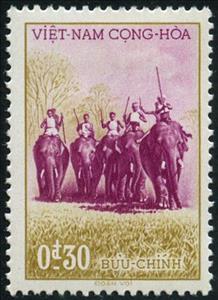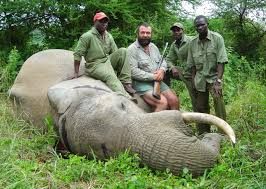Stamp: 3rd Year Ngo Dinh Diem 2 (Vietnam, South 1957)
3rd Year Ngo Dinh Diem 2 (Vietnam, South 1957)
07 July (Vietnam, South ) within release History goes into circulation Stamp 3rd Year Ngo Dinh Diem 2 face value 0.30 South Vietnamese đồng
| Stamp 3rd Year Ngo Dinh Diem 2 in catalogues | |
|---|---|
| Michel: | Mi:VN-S 136 |
| Yvert et Tellier: | Yt:VN-S 66 |
Stamp is square format.
Also in the issue History:
- Stamp - 3rd Year Ngo Dinh Diem 1 face value 0.20;
- Stamp - 3rd Year Ngo Dinh Diem 2 face value 0.30;
|
Data entry completed
50%
|
|
|---|---|
| Stamp 3rd Year Ngo Dinh Diem 2 in digits | |
| Country: | Vietnam, South |
| Date: | 1957-07-07 |
| Perforation: | 13 |
| Emission: | Commemorative |
| Format: | Stamp |
| Face Value: | 0.30 South Vietnamese đồng |
Stamp 3rd Year Ngo Dinh Diem 2 it reflects the thematic directions:
Elephants are the largest living land animals. Three living species are currently recognised: the African bush elephant (Loxodonta africana), the African forest elephant (L. cyclotis), and the Asian elephant (Elephas maximus). They are the only surviving members of the family Elephantidae and the order Proboscidea; extinct relatives include mammoths and mastodons.
Hunting is the human practice of seeking, pursuing, capturing, or killing wildlife or feral animals. The most common reasons for humans to hunt are to exploit the animal's body for meat and useful animal products (fur/hide, bone/tusks, horn/antler, etc.), for recreation/taxidermy (see trophy hunting), although it may also be done for non-exploitative reasons such as removing predators dangerous to humans or domestic animals (e.g. wolf hunting), to eliminate pests and nuisance animals that damage crops/livestock/poultry or spread diseases (see varminting), for trade/tourism (see safari), or for ecological conservation against overpopulation and invasive species.
Animals are multicellular, eukaryotic organisms of the kingdom Animalia (also called Metazoa). All animals are motile, meaning they can move spontaneously and independently, at some point in their lives. Their body plan eventually becomes fixed as they develop, although some undergo a process of metamorphosis later on in their lives. All animals are heterotrophs: they must ingest other organisms or their products for sustenance.
An anniversary is the date on which an event took place or an institution was founded in a previous year, and may also refer to the commemoration or celebration of that event. For example, the first event is the initial occurrence or, if planned, the inaugural of the event. One year later would be the first anniversary of that event. The word was first used for Catholic feasts to commemorate saints. Most countries celebrate national anniversaries, typically called national days. These could be the date of independence of the nation or the adoption of a new constitution or form of government. The important dates in a sitting monarch's reign may also be commemorated, an event often referred to as a "Jubilee".




